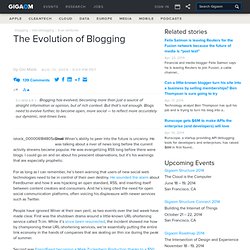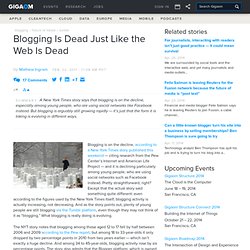

Millions More Bloggers and Blog Readers. Blogs are sometimes overlooked as a significant source of online buzz in comparison to social networking sites, yet consumer interest in blogs keeps growing.

By the end of 2011, NM Incite, a Nielsen/McKinsey company, tracked over 181 million blogs around the world, up from 36 million only five years earlier in 2006. Bloggers: Who are they? It’s no surprise that the growing number of blogs mirrors a growth in bloggers. Overall, 6.7 million people publish blogs on blogging websites, and another 12 million write blogs using their social networks.
So, who are blog writers and what else do they do online? Bloggers: Where do they read and post? Three out of the top 10 social networking sites in the U.S. – Blogger, WordPress and Tumblr – are for consumer-generated blogs. Pinterest points towards evolving tastes in the Blogosphere To learn more about blogs and social media usage, please read Nielsen and NM Incite's U.S.
Mind Map: What is the Future of Blogging? Steve Rubel is SVP, Director of Insights for Edelman Digital, a division of Edelman.

He is charged with helping clients identify emerging technologies and trends that can be applied in marketing communications programs. He explores these topics on his lifestream site and in his bi-weekly AdAge column. A little over five years ago, sites like Typepad, Blogger and WordPress dazzled by empowering anyone to instantaneously share his or her thoughts with the world; My how times change. Today, however, in a world where thousands of status updates and tweets whiz by our screens every hour, blogging arguably feels slow. So is blogging dead? From my point of view, blogging's future will likely flow down one of two paths: either it will evolve and grow into something else (like many species have) or it will succumb to Darwinism and become extinct (like the Dodo).
Evolution If blogging is to evolve, there are a number of potential outcomes. Darwinism Add to the conversation. The Evolution of Blogging. Dave Winer’s ability to peer into the future is uncanny.

He was talking about a river of news long before the current activity streams became popular. He was evangelizing RSS long before there were blogs. I could go on and on about his prescient observations, but it’s his warnings that are especially prophetic. For as long as I can remember, he’s been warning that users of new social web technologies need to be in control of their own destiny. He sounded the alarm about Feedburner and how it was hijacking an open standard, RSS, and inserting itself between content creators and consumers. People have ignored Winer at their own peril, as two events over the last week have made clear. Second was FriendFeed becoming a Mark Zuckerberg Production thanks to a $50 million buyout by Facebook. The cynical me believes that it’s foolish for any of us to expect that Web 2.0 companies be in the business of providing services for charity.
Blogging: The Evolution Why? Blogging needs to be social. Blogging Is Dead Just Like the Web Is Dead: Tech News and Analysis « Blogging is on the decline, according to a New York Times story published this weekend — citing research from the Pew Center’s Internet and American Life Project — and it is declining particularly among young people, who are using social networks such as Facebook instead.

Pretty straightforward, right? Except that the actual story said something quite different: even according to the figures used by the New York Times itself, blogging activity is actually increasing, not decreasing. And as the story points out, plenty of young people are still blogging via the Tumblr platform, even though they may not think of it as “blogging.” What blogging is really doing is evolving. The NYT story notes that blogging among those aged 12 to 17 fell by half between 2006 and 2009 according to the Pew report, but among 18 to 33-year-olds it only dropped by two percentage points in 2010 from two years earlier — which isn’t exactly a huge decline.
Related GigaOM Pro content (sub req’d):